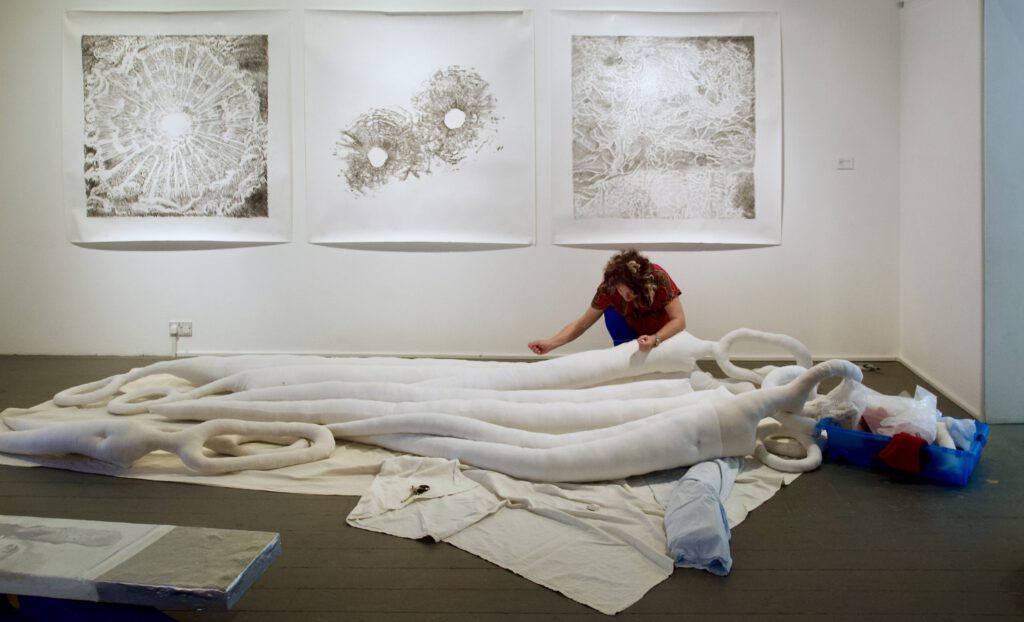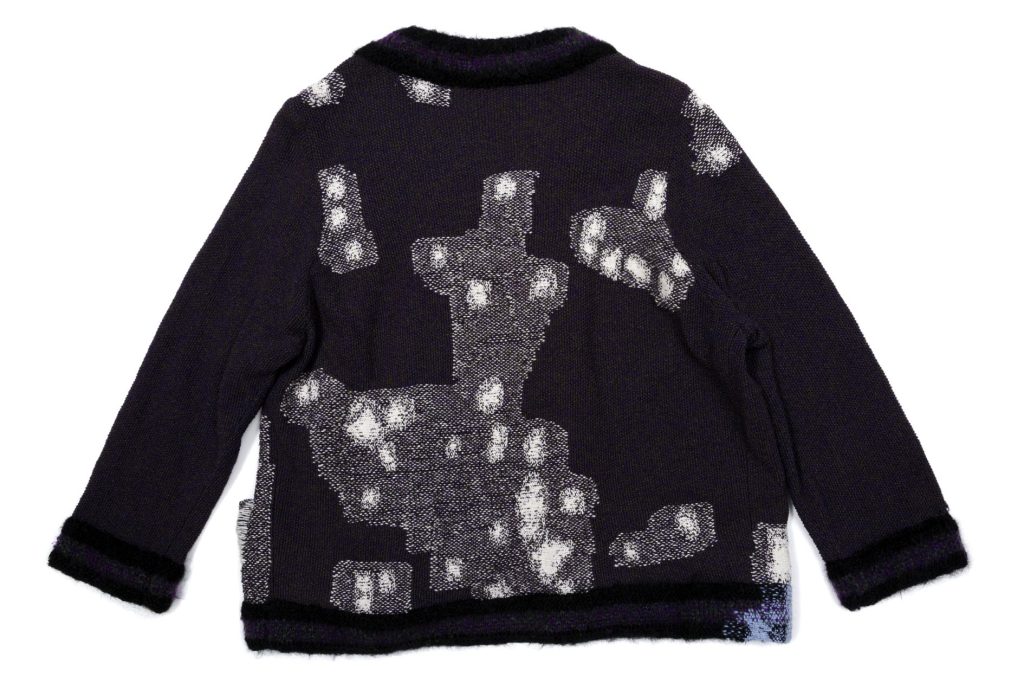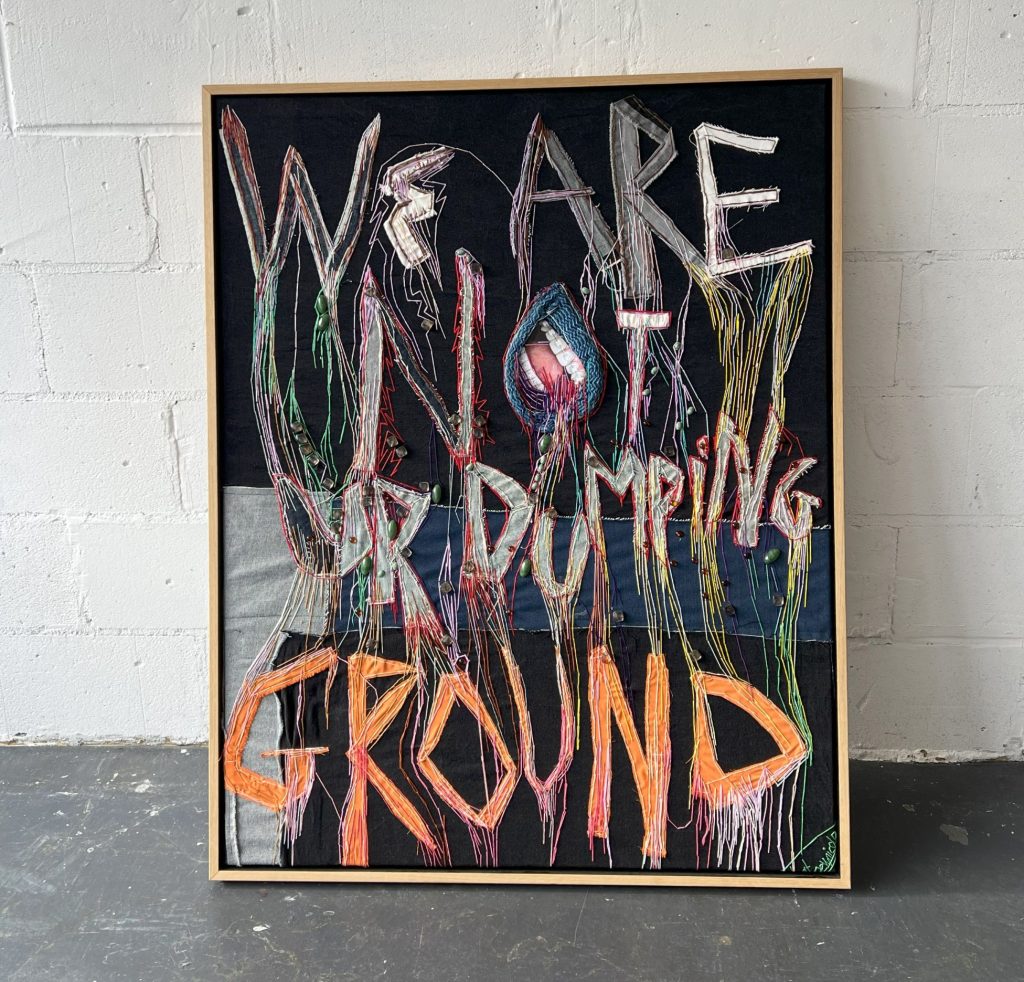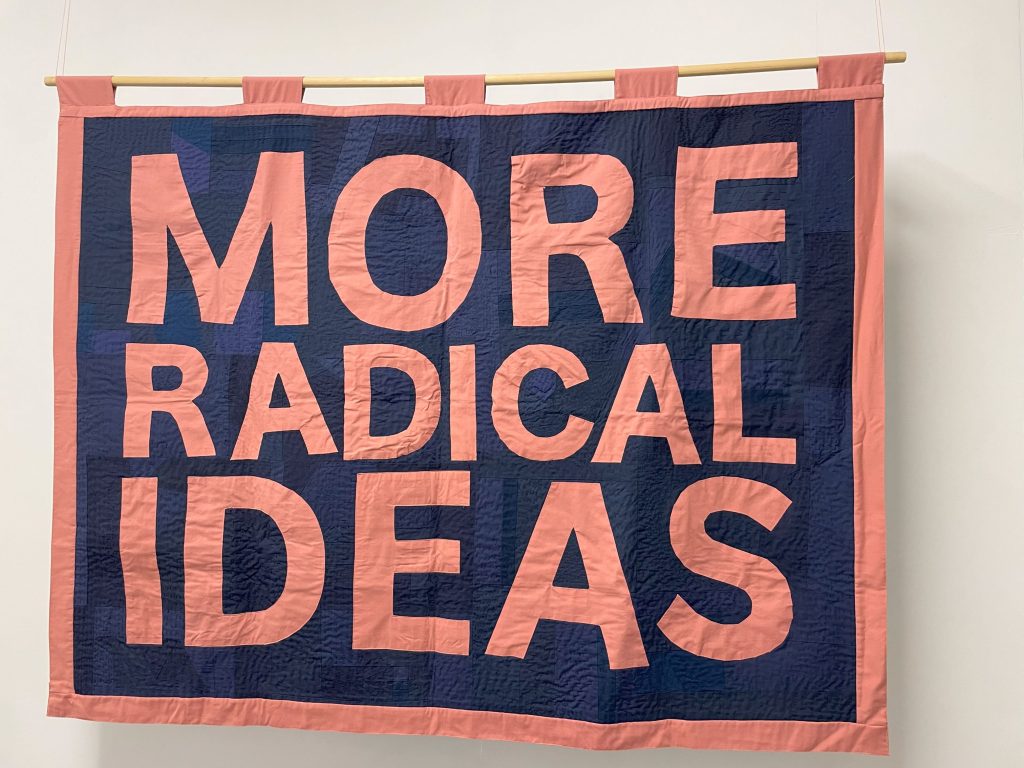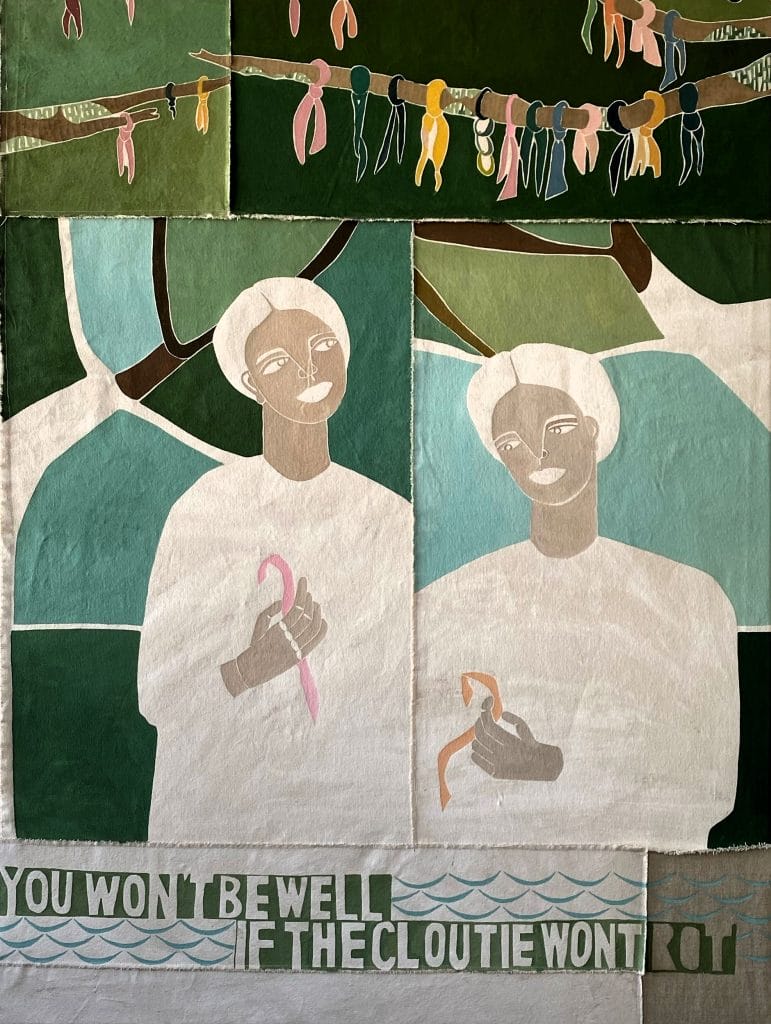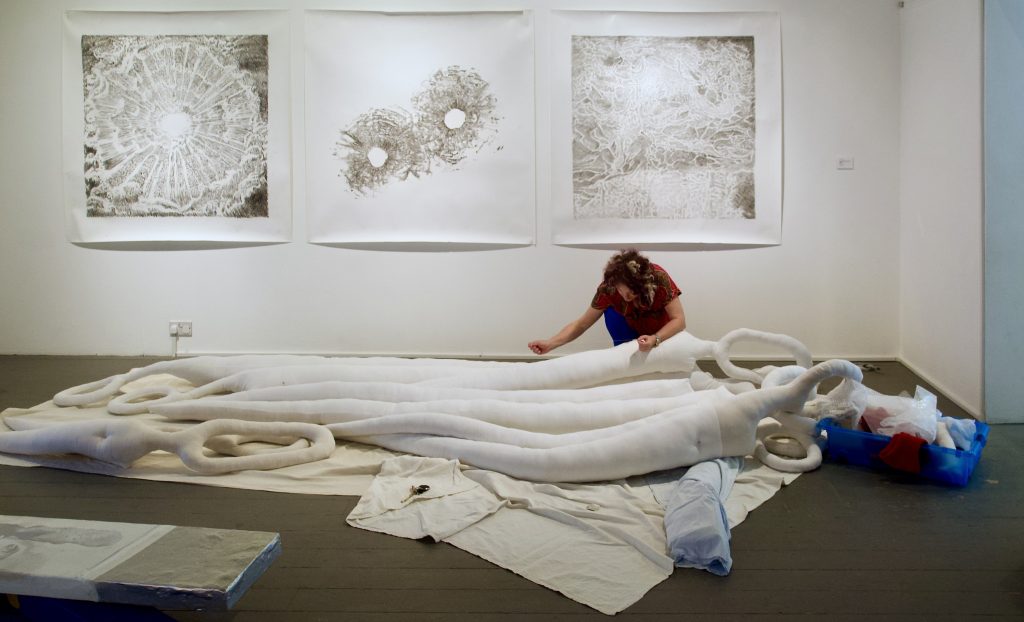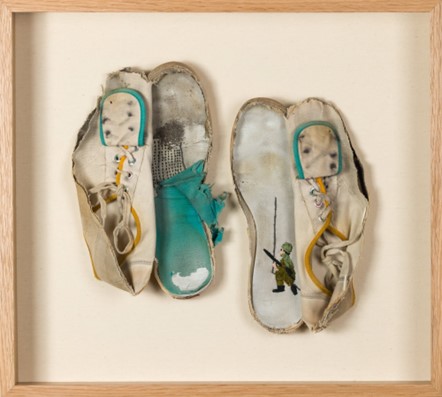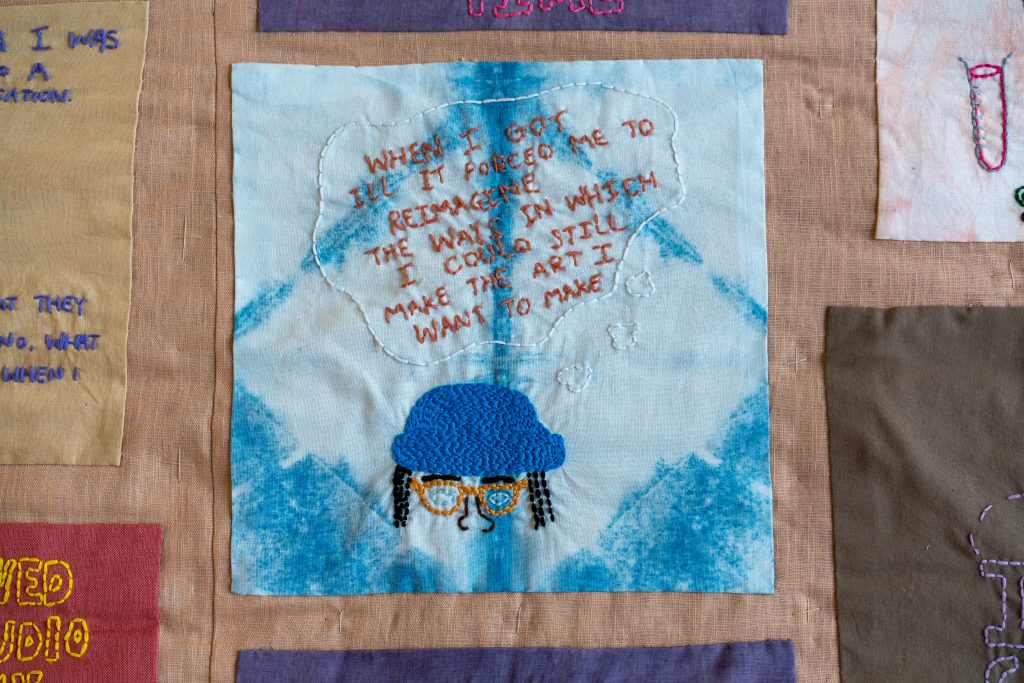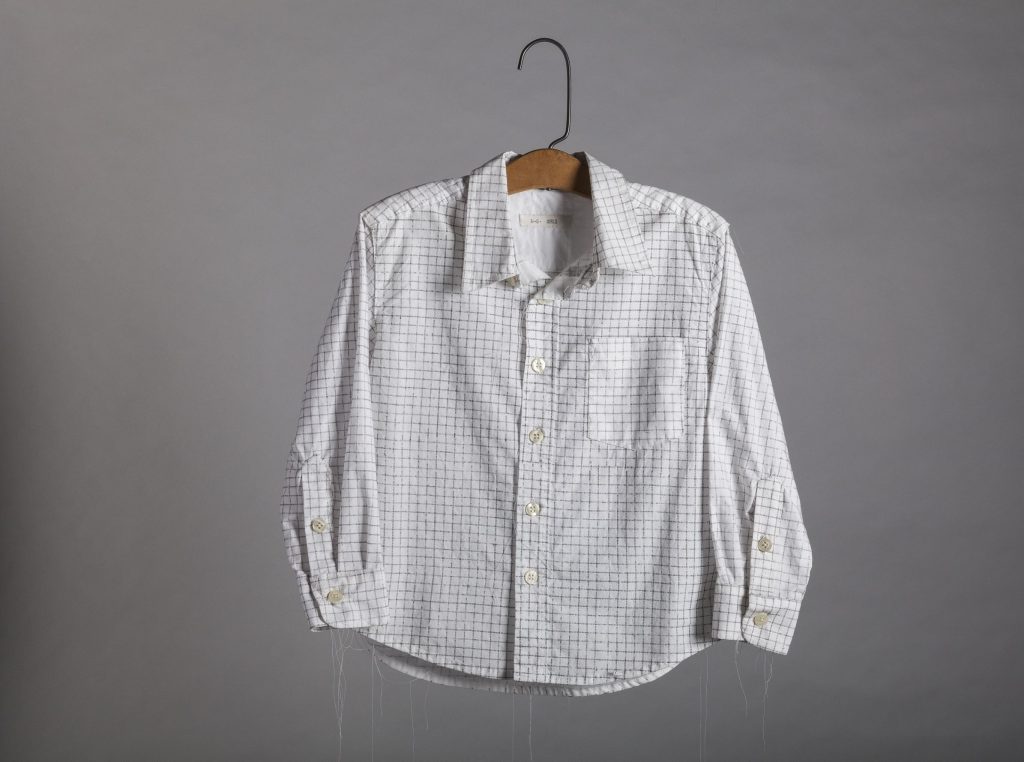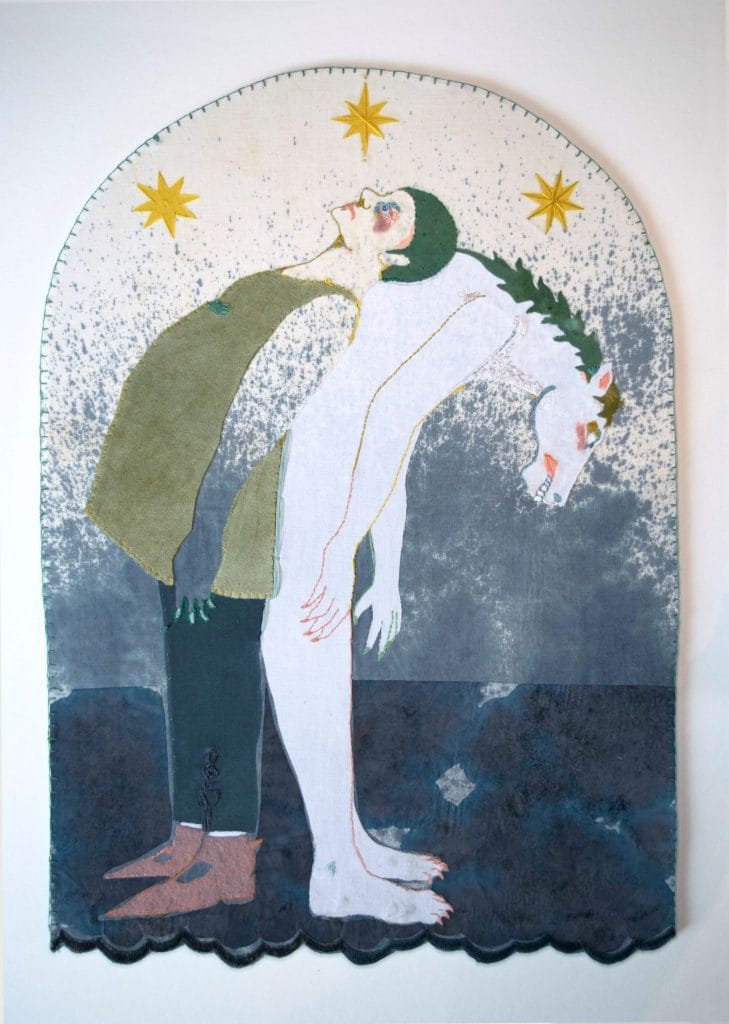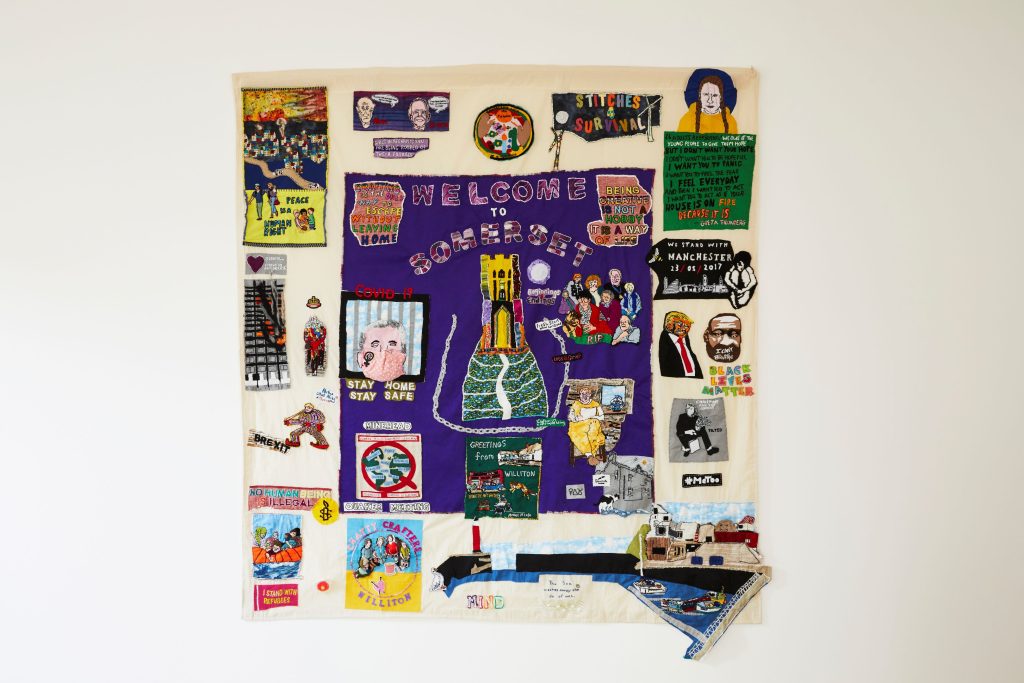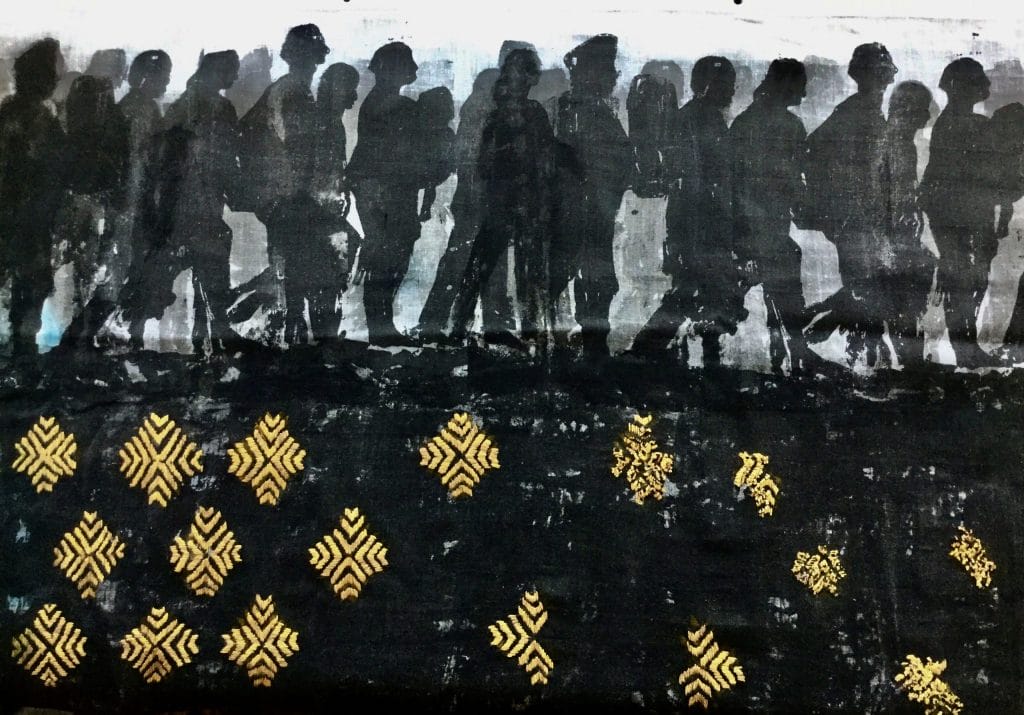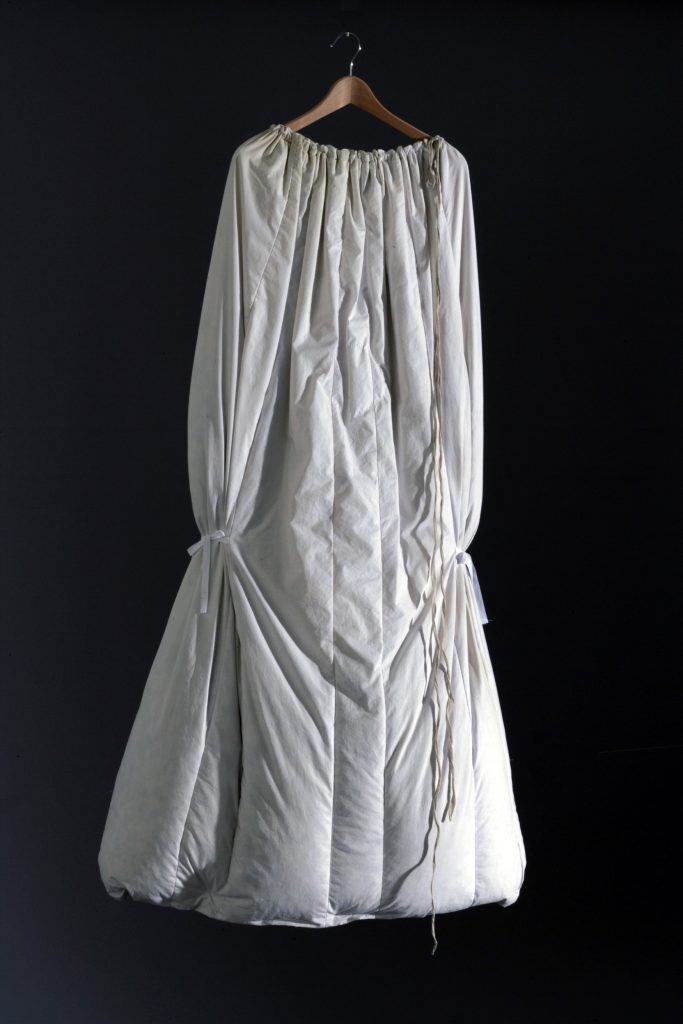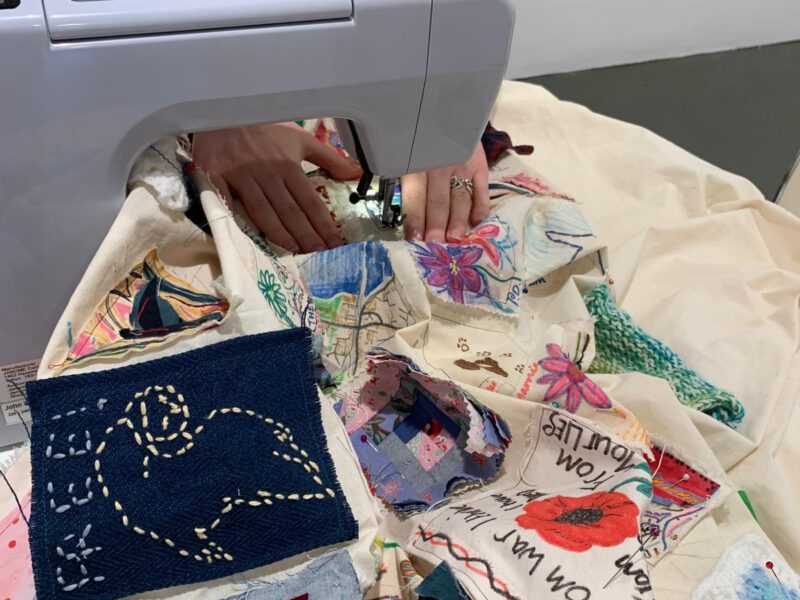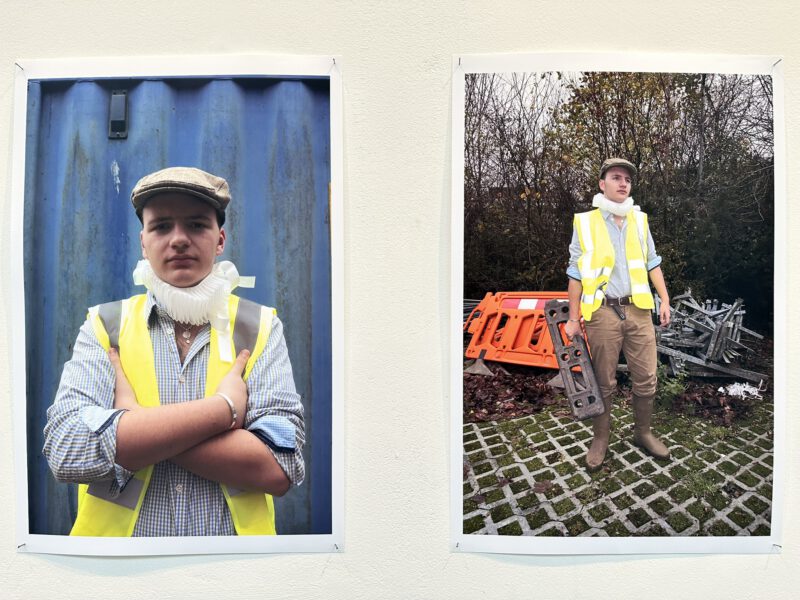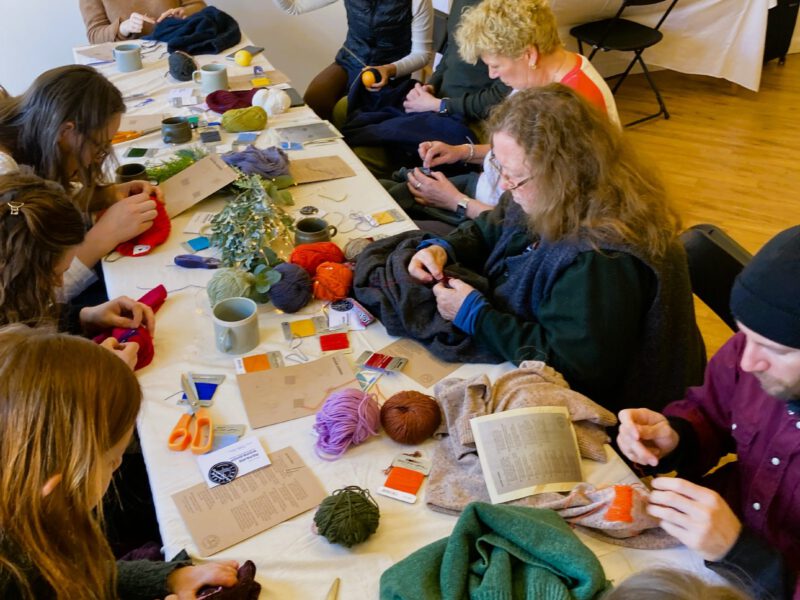LYN BARLOW
The Reluctant Rebel
Based in Somerset, Lyn Barlow’s three quilts are autobiographical, spanning 60 years. Inspired by the Bayeux and Quaker tapestries, her work recounts details of a life both ordinary and extraordinary. Her story is of sadness and strife, but one that also demonstrates resilience and integrity, and she is devoted to community and care. Applying a protest banner format, her intention is not to preach but to engage and gently challenge.
Listen to Lyn Barlow’s Quilt Music soundtrack on Spotify
ALI BASSETT
Ali Bassett is a multi-disciplinary artist living in Cornwall. Her process always begins with a story, inspired by folklore, superstitions, and old wives tales, constructed as painted patchwork pieces handstitched together, and like quilts, her paintings contain proverbial wisdoms to be handed down.
Her studio is piled high with canvas patchwork pieces that she can reuse and play with for ideas and later work. Her palette is typically muted, as faded as the old stories she loves to tell.
NICOLE CHUI
NOT UR DUMPING GROUND
Nicole Chui is a Hong Kong-born, London-based embroidery artist whose work demands attention. Through a mix of printed imagery and freestyle hand embroidery, Chui delights in disrupting perfection. She encourages others to take her cue, embrace their raw emotions, and break boundaries.
NOT UR DUMPING GROUND is a loud protest on behalf of the people living in countries where the UK’s waste and recycling are dumped. The UK is one of the biggest producers of plastic waste in the world, second to the US. Leaving the European Union in 2021 has allowed the UK to take advantage of a loophole in the law which allows it to ship more than 7,133 metric tonnes of waste and recycled goods to non-OECD countries, including Malaysia, Pakistan, Vietnam, Indonesia, and Turkey. This piece is a reminder that many people aren’t represented in the ‘green space’ and suffer the consequences of significant decisions affecting the environment daily.
LENKA CLAYTON
Hand-Typed Check Shirt
Lenka Clayton is a British-American conceptual artist and educator based in Pittsburgh. Her work contemplates, exaggerates, and defamiliarises accepted rules and practices of everyday life, extending the ordinary to the poetic and absurd.
Hand-Typed Check Shirt explores the relationship between the hand-made and machine-made by misusing a machine designed to accomplish one kind of task, to achieve another that it is quite unsuited for. A cotton shirt originally made by an anonymous worker was disassembled at the seams into its 21 component parts and each piece run through a typewriter in two directions. The equals key ‘=’ was pressed thousands of times to create a check pattern, hand-typed directly onto the fabric. Once printed the pieces were hand-sewn back together. At first glance the pattern may appear industrially printed, though on closer inspection mistakes can be glimpsed; an accidental ‘1/2’ or misaligned row.
JULIE COOK
Asentamiento Dress
With 20 years of nursing experience, Julie Cook’s work explores narratives of trauma and care, as she crafts textiles associated with comfort into wearable therapy.
Influenced by an expressive Andalusian culture and Flamenco song and dance, the Asentamiento Dress provides emotional catharsis to the wearer through the act of performance. Made from a cotton duvet, a concealed silk poultice is fixed to the inside to soothe the wearer’s heart; with fabric guides to hold the wearer’s arms in place within its warmth, wrapping the wearer in safety.
Listen to a poem by Colette Bryce responding to Julie Cook’s Asentamiento Dress.
Courtesy of Crafts Council
AYA HAIDAR
The Soleless Series
This body of work was inspired by a four-month artist residency program with Deveron Project, dedicated to actively engaging and reintegrating newly arrived Syrian refugee communities into the UK. Through direct involvement in the challenging process of resettlement, Haidar shares firsthand accounts and interpersonal exchanges that unfold over perilous passages. The narratives encapsulate stories of separation, loss, and the everyday realities faced by these individuals, intimately embroidered onto the undersides of worn shoes.
The Seamstress Series
An ongoing body of work based on photographs taken by Haidar in and around her homeland of Lebanon. Her snapshots depict the country’s street life and domestic exteriors. Adding a new layer to these images, Haidar intervenes by taking these snapshots, printing them on fabric, and embroidering them to offer new meaning. By embroidering bullet holes, Haidar constructs colourful bandages, making the scars of her country’s past more prominent. This serves to highlight the cycles of violence that keep resurfacing.
ELIZABETH LOVEDAY
A Cornish textile artist and illustrator who delights in the weird and wonderful, and admits she’s generally attracted to dark, slightly odd, or disturbing subjects. She makes surreal, often bizarre pictorial textiles inspired by local folk tales and her work ranges from images of sinister clowns, mournful performing half-human beasts, and real-life, political activists.
In the early 1900s, a young Newlyn girl, Aida Harvey James, created a unique textile piece during Mrs Dick’s Needlecraft Class—a rare artifact now safeguarded in Penlee House Gallery & Museum’s archive. As part of Social Fabric, Elizabeth was commissioned to investigate how the sample was created, producing test pieces as she explored Aida’s process, finally producing this final sample that is as close as she could imagine to attending Mrs Dick’s Class herself and following the same instruction.
You can listen to Elizabeth’s journey here.
ANGELA MADDOCK
Mothers are Wolves
This body of work explores the transitional space between mother and child as described by the paediatrician and psychoanalyst, Donald Winnicott: a holding space, a place of nurturing and attachment, but also one of greed, obsession, and desire. In Mothers are Wolves Maddock plays with the material function of scissors to suggest a playful space can also be formless, overwhelming, and potentially smothering. Scissors enable separation, and describe the process of shaping ourselves, giving form to the concept of being an individual. Scissors that fail are troublesome things.
Listen to BBC Radio 4, Archive on 4: From Donald Winnicott to the Naughty Step (58 minutes)
One of the 20th century’s most famous psychoanalysts, Winnicott gave 50 BBC broadcasts about motherhood between 1943-1962.
Watch a short film with Angela Maddock talking about her work in Social Fabric.
AMARJEET NANDHRA
My Other Colours
Displacement
Nandhra’s works are contemporary interpretations of Phulkari, an embroidery technique from the Punjab region of India, which forms an essential component of the life of the region’s women and provides a powerful symbol of Punjabi cultural identity. Ancestral maps document the daily lives and social relationships of the makers.
Nandhra’s work plays with the traditional colours, patterns, and marks used, reapplying and reimagining this folk knowledge to address issues of identity, heritage, and displacement.
LOW PROFILE
More Radical Ideas
Build it Together
Rachel Dobbs and Hannah Rose live and work in Plymouth, and have been working together in collaboration since 2003.
Through their artworks, they find ways to create human-to-human connection, temporary communities, collective experiences, or situations that get people thinking about their own role as an individual who is also part of a group. They celebrate the strength of coming together, camaraderie, resourcefulness, resilience, generosity, loyalty, and not giving up.
More Radical Ideas and Build it Together both came out of a six-month, public-facing artists’ residency and exhibition at GROW Plymouth, focussing on the co-creation of a new body of collaboratively produced artworks by LOW PROFILE and Plymouth residents.
JAMILA PROWSE
Crip Quilt
Jamila Prowse is an artist and writer, propelled by curiosity and a desire to understand herself through making. Informed by her lived experience of disability, mixed-race ancestry, and the loss of her father at a young age, her work is research-driven and indebted to Black feminist and crip scholars.
Crip Quilt is a large-scale, patchwork, textile quilt translating the individual and collective experience of disability. With contributions from the National Disability Art Collection and Archive, three new collated oral histories with disabled artists of colour and the artist’s own lived experience; each square in the patchwork relays a snapshot of a disabled artist’s life. While making the quilt, Jamila found that stitching relieved symptoms of her disability, and her embroidered reflections took on a diaristic, confessional tone. Made on crip time, across 15 months, predominantly from the artist’s sick bed, the process became therapeutic.
The materiality of the quilt is weighted to reflect the use of weighted blankets to manage anxiety disorders and alleviate flare-ups and burnouts for neurodivergent people. The quilt will be accompanied by creative access adjustments of a soundscape, which is part audio description and part audio guide, and a moving image work for remote viewing.
Watch this film about the making of Crip Quilt.
CELIA PYM
Vivien Leigh’s jacket and dress
Celia Pym lives and works in London. She has been exploring damage and repair in textiles since 2007. Working with garments that belong to individuals as well as items in museum archives, she has extensive experience with the spectrum and stories of damage, from small moth holes to larger accidents with fire. Her interests concern the evidence of damage, and how repair draws attention to the places where garments and cloth wear down and grow thin. In clothing, this is often to do with use and how the body moves. She explores the difficulties of mending other people’s clothes, the materials used for mending, and making damage visible
Vivien Leigh’s jacket and dress were originally made by Women’s Home Industries. Vivian Leigh had visited James Ivory and his partner Ismail Merchant, in Bombay, now Mumbai, in 1965. The heavy wool of its construction suggested that she packed poorly or too hastily, leaving the inappropriate twin set with the pair as she travelled on to Darjeeling, where she grew up, with the intention of collecting it in London or New York, which inevitably, never happened. James Ivory passed the garments onto Pym after storing them for more than 50 years.
Elizabeth’s Cardigan
Made by Murray Brothers Woollen Mill in Hawick, this was Pym’s Great Aunt’s afternoon walk cardigan, its patch pockets invariably stuffed with tissues and Foxes Glacier mints, a clear shiny hard-boiled sweet. The darning has gone wide to strengthen the fragile thin areas and then woven into the holes. The cuffs and hems were frayed and have been reinforced by Pym and the moth holes darned with a variety of white wools.
Roly’s Sweater
Belonging to Pym’s Great Uncle Roland the handknitted sweater has been much worn, and much mended. The robust and ready darns in cream and white are darns carried out by his sister, Elizabeth. After her death Pym took up the role, adding blue plain woven darns. The jumper lives in an archival box now, with new holes appearing as the thin threads age and a little more work for Pym as she prepares it for exhibition.

